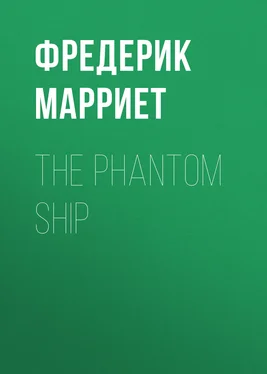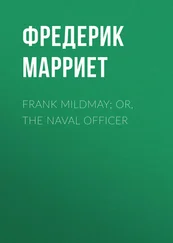Фредерик Марриет - The Phantom Ship
Здесь есть возможность читать онлайн «Фредерик Марриет - The Phantom Ship» — ознакомительный отрывок электронной книги совершенно бесплатно, а после прочтения отрывка купить полную версию. В некоторых случаях можно слушать аудио, скачать через торрент в формате fb2 и присутствует краткое содержание. Жанр: foreign_prose, literature_19, foreign_antique, на английском языке. Описание произведения, (предисловие) а так же отзывы посетителей доступны на портале библиотеки ЛибКат.
- Название:The Phantom Ship
- Автор:
- Жанр:
- Год:неизвестен
- ISBN:нет данных
- Рейтинг книги:5 / 5. Голосов: 1
-
Избранное:Добавить в избранное
- Отзывы:
-
Ваша оценка:
- 100
- 1
- 2
- 3
- 4
- 5
The Phantom Ship: краткое содержание, описание и аннотация
Предлагаем к чтению аннотацию, описание, краткое содержание или предисловие (зависит от того, что написал сам автор книги «The Phantom Ship»). Если вы не нашли необходимую информацию о книге — напишите в комментариях, мы постараемся отыскать её.
The Phantom Ship — читать онлайн ознакомительный отрывок
Ниже представлен текст книги, разбитый по страницам. Система сохранения места последней прочитанной страницы, позволяет с удобством читать онлайн бесплатно книгу «The Phantom Ship», без необходимости каждый раз заново искать на чём Вы остановились. Поставьте закладку, и сможете в любой момент перейти на страницу, на которой закончили чтение.
Интервал:
Закладка:
"Good morning, my son," said the captain, taking his pipe out of his mouth for a moment. "We are detained by the supercargo, who appears not over-willing to come on board; the boat has been on shore this hour waiting for him, and we shall be last of the fleet under weigh. I wish the Company would let us sail without these gentlemen , who are ( in my opinion) a great hindrance to business; but they think otherwise on shore."
"What is their duty on board?" replied Philip.
"Their duty is to look after the cargo and the traffic, and if they kept to that, it would not be so bad; but they interfere with everything else and everybody, studying little except their own comforts; in fact, they play the king on board, knowing that we dare not affront them, as a word from them would prejudice the vessel when again to be chartered. The Company insist upon their being received with all honours. We salute them with five guns on their arrival on board."
"Do you know anything of this one whom you expect?"
"Nothing, but from report. A brother captain of mine (with whom he has sailed) told me that he is most fearful of the dangers of the sea, and much taken up with his own importance."
"I wish he would come," replied Philip; "I am most anxious that we should sail."
"You must be of a wandering disposition, my son: I hear that you leave a comfortable home, and a pretty wife to boot."
"I am most anxious to see the world," replied Philip; "and I must learn to sail a ship before I purchase one, and try to make the fortune that I covet." (Alas! how different from my real wishes, thought Philip, as he made this reply.)
"Fortunes are made, and fortunes are swallowed up too, by the ocean," replied the captain. "If I could turn this good ship into a good house, with plenty of guilders to keep the house warm, you would not find me standing on this poop. I have doubled the Cape twice, which is often enough for any man; the third time may not be so lucky."
"Is it so dangerous, then?" said Philip.
"As dangerous as tides and currents, rocks and sand-banks, hard gales and heavy seas, can make it,—no more! Even when you anchor in the bay, on this side of the Cape, you ride in fear and trembling, for you may be blown away from your anchor to sea, or be driven on shore among the savages, before the men can well put on their clothing. But when once you're well on the other side of the Cape, then the water dances to the beams of the sun as if it were merry, and you may sail for weeks with a cloudless sky and a flowing breeze, without starting tack or sheet, or having to take your pipe out of your mouth."
"What port shall we go into, Mynheer?"
"Of that I can say but little. Gambroon, in the Gulf of Persia, will probably be the first rendezvous of the whole fleet. Then we shall separate: some will sail direct for Bantam, in the island of Java; others will have orders to trade down the Straits for camphor, gum, benzoin, and wax; they have also gold and the teeth of the elephant to barter with us: there (should we be sent thither) you must be careful with the natives, Mynheer Vanderdecken. They are fierce and treacherous, and their curved knives (or creeses, as they, call them) are sharp and deadly poisoned. I have had hard fighting in those Straits both with Portuguese and English."
"But we are all at peace now."
"True, my son; but when round the Cape, we must not trust to papers signed at home: and the English press us hard, and tread upon our heels wherever we go. They must be checked; and I suspect our fleet is so large and well appointed in expectation of hostilities."
"How long do you expect your voyage may occupy us?"
"That's as may be: but I should say about two years;—nay, if not detained by the factors, as I expect we shall be, for some hostile service, it may be less."
Two years, thought Philip, two years from Amine! and he sighed deeply, for he felt that their separation might be for ever.
"Nay, my son, two years is not so long," said Mynheer Kloots, who observed the passing cloud on Philip's brow. "I was once five years away, and was unfortunate, for I brought home nothing, not even my ship. I was sent to Chittagong, on the east side of the great Bay of Bengala, and lay for three months in the river. The chiefs of the country would detain me by force; they would not barter for my cargo, or permit me to seek another market. My powder had been landed, and I could make no resistance. The worms ate through the bottom of my vessel, and she sank at her anchors. They knew it would take place, and that then they would have my cargo at their own price. Another vessel brought us home. Had I not been so treacherously served, I should have had no need to sail this time; and now my gains are small, the Company forbidding all private trading. But here he comes at last; they have hoisted the ensign on the staff in the boat; there—they have shoved off. Mynheer Hillebrant, see the gunners ready with their linstocks to salvo the supercargo."
"What duty do you wish me to perform?" observed Philip. "In what can I be useful?"
"At present you can be of little use, except in those heavy gales in which every pair of hands is valuable. You must look and learn for some time yet; but you can make a fair copy of the journal kept for the inspection of the Company, and may assist me in various ways, as soon as the unpleasant nausea, felt by those who first embark, has subsided. As a remedy, I should propose that you gird a handkerchief tight round your body so as to compress the stomach, and make frequent application of my bottle of schnapps, which you will find always at your service. But now to receive the factor of the most puissant Company. Mynheer Hillebrant, let them discharge the cannon."
The guns were fired, and soon after the smoke had cleared away, the boat, with its long ensign trailing on the water, was pulled alongside. Philip watched the appearance of the supercargo, but he remained in the boat until several of the boxes with the initials and arms of the Company were first handed on the deck; at last the supercargo appeared.
He was a small, spare, wizen-faced man, with a three-cornered cocked hat, bound with broad gold lace, upon his head, under which appeared a full-bottomed flowing wig, the curls of which descended low upon his shoulders. His coat was of crimson velvet, with broad flaps: his waistcoat of white silk, worked in coloured flowers, and descending half-way down to his knees. His breeches were of black satin, and his legs were covered with white silk stockings. Add to this, gold buckles at his knees and in his shoes, lace ruffles to his wrists, and a silver-mounted cane in his hand, and the reader has the entire dress of Mynheer Jacob Janz Von Stroom, the supercargo of the Hon. Company, appointed to the good ship Ter Schilling .
As he looked round him, surrounded at a respectful distance by the captain, officers, and men of the ship, with their caps in their hands, the reader might be reminded of the picture of the "Monkey who had seen the World" surrounded by his tribe. There was not, however, the least inclination on the part of the seamen to laugh, even at his flowing, full-bottomed wig: respect was at that period paid to dress; and although Mynheer Von Stroom could not be mistaken for a sailor, he was known to be the supercargo of the Company, and a very great man. He therefore received all the respect due to so important a personage.
Mynheer Von Stroom did not, however, appear very anxious to remain on deck. He requested to be shown into his cabin, and followed the captain aft, picking his way among the coils of ropes with which his path was encumbered. The door was opened, and the supercargo disappeared. The ship was then got under weigh, the men had left the windlass, the sails had been trimmed, and they were securing the anchor on board, when the bell of the poop-cabin (appropriated to the supercargo) was pulled with great violence.
Читать дальшеИнтервал:
Закладка:
Похожие книги на «The Phantom Ship»
Представляем Вашему вниманию похожие книги на «The Phantom Ship» списком для выбора. Мы отобрали схожую по названию и смыслу литературу в надежде предоставить читателям больше вариантов отыскать новые, интересные, ещё непрочитанные произведения.
Обсуждение, отзывы о книге «The Phantom Ship» и просто собственные мнения читателей. Оставьте ваши комментарии, напишите, что Вы думаете о произведении, его смысле или главных героях. Укажите что конкретно понравилось, а что нет, и почему Вы так считаете.












